Sociocultural Aspects of Development
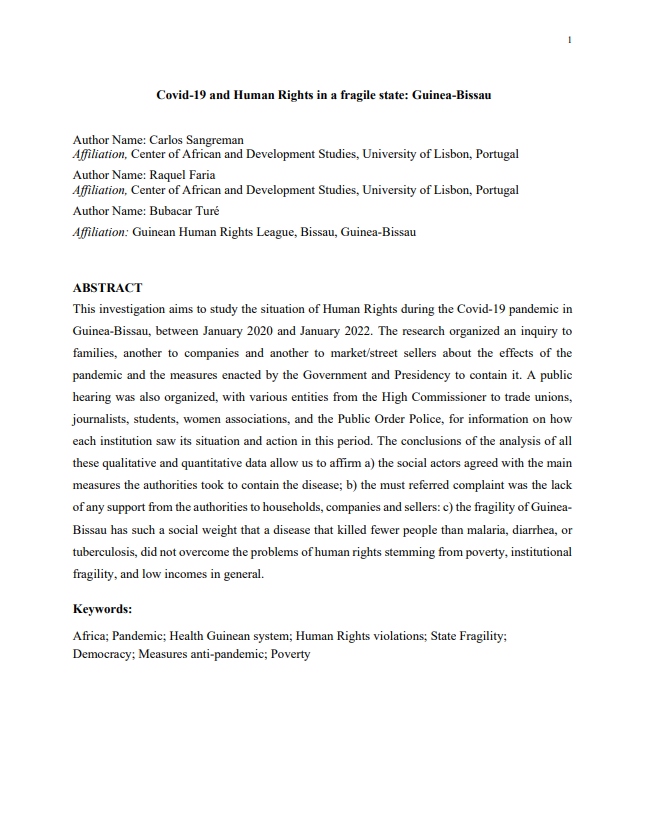
Covid-19 and Human Rights in a fragile state : Guinea-Bissau
Abstract:
COVID-19 and Human Rights in a Fragile State: Guinea-Bissau aims to study the situation of Human Rights during the Covid-19 pandemic in Guinea-Bissau, between January 2020 and January 2022. The research organized an inquiry to families, another to companies and another to market/street sellers about the effects of the pandemic and the measures enacted by the Government and Presidency to contain it. A public hearing was also organized, with various entities from the High Commissioner to trade unions, journalists, students, women associations, and the Public Order Police, for information on how each institution saw its situation and action in this period. The conclusions of the analysis of all these qualitative and quantitative data allow us to affirm a) the social actors agreed with the main measures the authorities took to contain the disease; b) the must referred complaint was the lack of any support from the authorities to households, companies and sellers: c) the fragility of Guinea-Bissau has such a social weight that a disease that killed fewer people than malaria, diarrhea, or tuberculosis, did not overcome the problems of human rights stemming from poverty, institutional fragility, and low incomes in general.
Quotation:
Sangreman, C., Faria, R. T., & Turé, B. (2022). COVID-19 and Human Rights in a Fragile State: Guinea-Bissau. In P. Andrade, & M. Martins (Ed.), Handbook of Research on Urban Tourism, Viral Society, and the Impact of the COVID-19 Pandemic (pp. 341-360). IGI Global. https://doi.org/10.4018/978-1-6684-3369-0.ch018
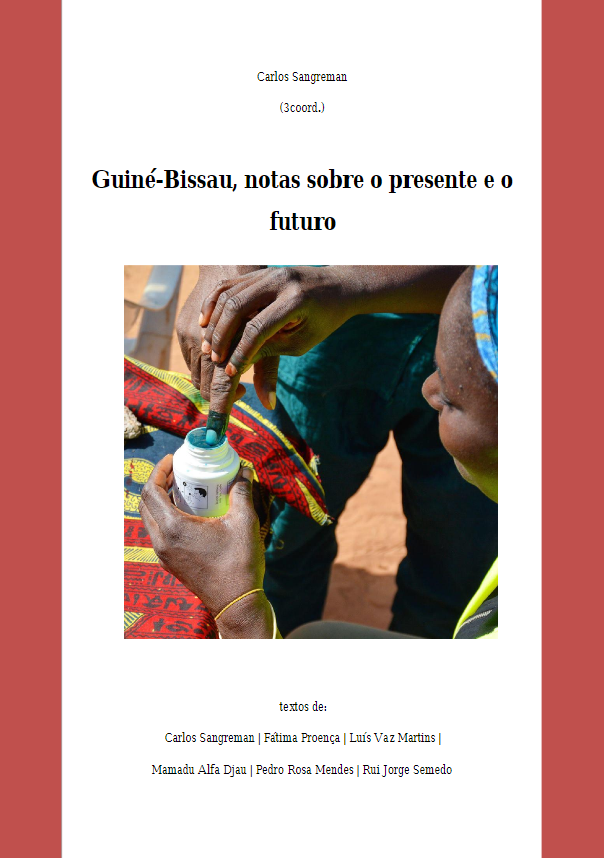
Guiné-Bissau – Notas sobre o presente e o futuro
Abstract:
The idea of publishing the book Notas sobre o presente e o futuro of Guinea-Bissau arose from the need to get to know the country better and to think about its recent past, which will inevitably contribute to its near future. The aim was to collect existing texts that were revised and updated and to ask some authors to reflect on themes based on the motto “Guinea-Bissau, notes on the present and the future”. These texts are published at a special moment in the country. After a period of a government appointed by the military that took power in 2012, elections were held in 2014 and a round table was held in Brussels where the country received a great deal of encouragement from its international partners – institutions and countries – in support of a government and a president that everyone had hoped would provide a more stable and successful evolution such as there had not been until then. But these expectations came up against a conflict between sovereign bodies, which frustrated this support and threw the country into a four-year period of instability that began to end with the legislative elections on 10 March 2019 but is only expected to return to normal institutional functioning with the presidential elections in November of the same year.
Quotation:
Sangreman, Carlos, Fátima Proença, Luís Vaz Martins, Mamadu Alfa Djau, Pedro Rosa Mendes e Rui Jorge Semedo Guiné-Bissau – Notas sobre o presente e o futuro, com, ISBN 978-989-20-9932-3, CESA-ISEG/ULisboa, 2019, Lisboa.
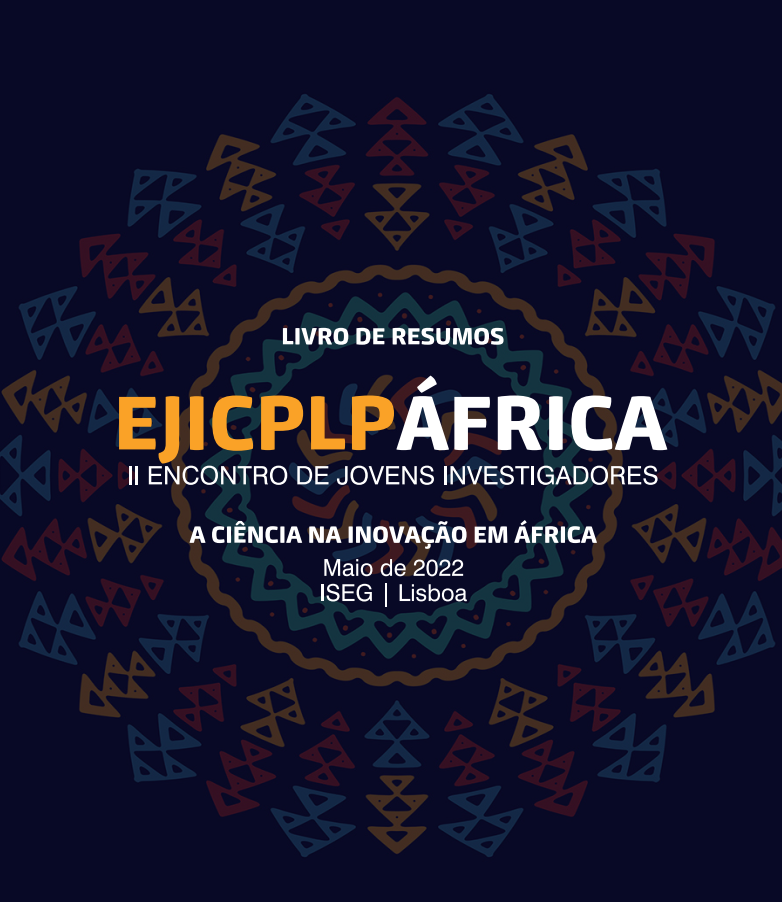
Ebook – EJICPLP Africa: Science in Innovation in Africa
Abstract:
The Meeting of Young Researchers from CPLP on Africa is an inclusive space for debate and scientific dissemination in African studies and in Portuguese language, in an innovative, democratic and multicultural perspective. The success of this project began in 2021, when it was proposed to bring participation and protagonism to young people, as agents of change in a living community in permanent transformation. In this context, the 2nd Meeting was held in May 2022, in Lisbon, where the role of science in innovation in Africa was discussed, exceeding all expectations, whether in the quality of the debates, the excellence and diversity of the works presented, or the massive adhesion of the participants. The Meeting took place thanks to the work carried out by the Organising Committee, an International Scientific Council, with the collaboration of the Centre for African and Development Studies (CEsA), as the proponent entity. in addition to the support of other partner institutions, such as the CPLP, Lisbon City Council (CML), Higher Institute of Economics and Management (ISEG), Catholic University of Angola (UCAN), Union of Portuguese Speaking Capital Cities (UCCLA), Eduardo Mondlane University (UEM – Mozambique), Association of Municipalities for Sustainable Development of the Umbria Region (FELCOS – Italy). The 2º Encontro de Jovens Investigadores da CPLP sobre África – Livro de Resumos was only possible thanks to the collaboration of numerous people, in particular the Organizing Committee, the Scientific Council, the Speakers, the Institutional Partners, the Medias Partners, the Volunteers and the Scientific Community.
Quotation:
D’Abril, Cristina Molares [et al.] (2022). “2º Encontro de Jovens Investigadores da CPLP sobre África. Livro de Resumos”. ISBN: 978-989-54687-3-7
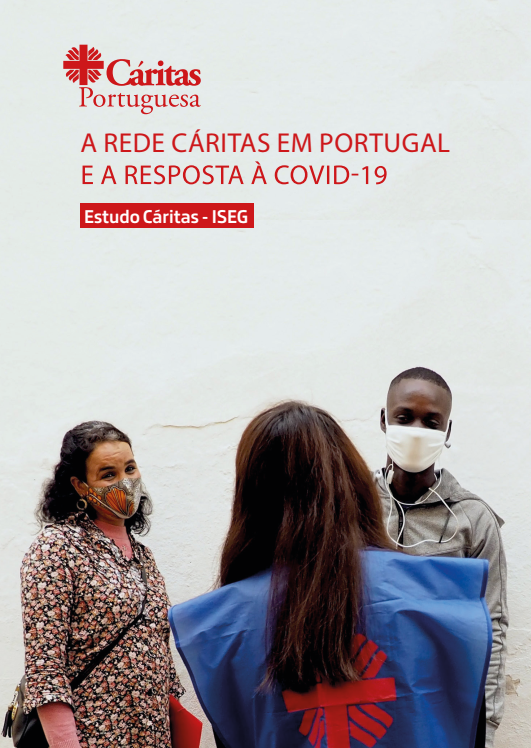
A Rede Cáritas em Portugal e a Resposta à Covid-19
Resumo:
A Rede Cáritas em Portugal e a Resposta à Covid-19 analyzes the importance of the social action of the Cáritas Network in Portugal in an unexpected and health emergency context, by documenting the organization’s response to the Covid-19 pandemic. An analysis is made of the continuity actions, but also of the innovations that emerged during the first year of the pandemic. With a presence that covers all the districts of Mainland Portugal and Islands, the Cáritas Network in Portugal developed, for the first time, a National Program of direct support to families in the form of goods and food stamps, as well as occasional and urgent financial support intended for payment of basic needs such as rent, health and electricity expenses, to a considerable number of beneficiaries (10,444 people, 3,205 families). The study shows that the Cáritas Network in Portugal was able to continue the food support activities and occasional support that it was already developing, given a greater demand from families: 60% of people who sought support from Cáritas in this period had never resorted to this kind of help.
Citação:
Pais Bernardo, Luís, Ana Luísa Silva, Renata Vieira de Assis e Luís Mah (Coord.). 2021. “A Rede Cáritas em Portugal e a Resposta à Covid-19”. Estudo Cáritas / CEsA-ISEG. Lisboa: Cáritas Portuguesa. Agosto.
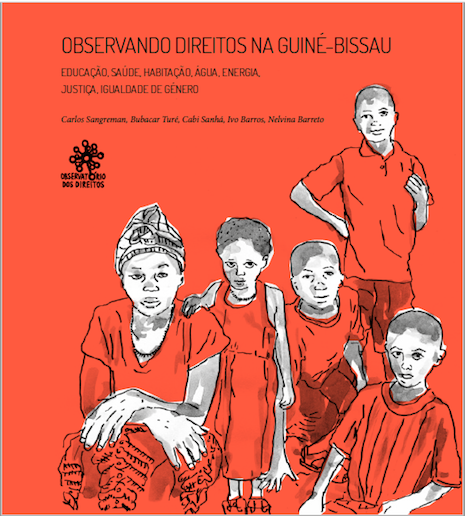
Observando direitos na Guiné-Bissau: educação, saúde, habitação, água, energia, justiça, igualdade de género
The Rights Observatory integrated in a structure such as Casa dos Direitos is an example of what civil society can do in fragile social contexts, but where power respects the Right to Opinion (even if at some times there is repression of media outlets such as radios and television and a climate of threat to critics of the situation at the time). The data collected on access to Economic and Social Human Rights, disseminated through books and exhibitions, in order to be used by activists and responsible authorities, has even been the basis for academic research at undergraduate, master’s and, this year, doctoral levels, especially in Portugal and Brazil.
Abstract:
The objective of Observando direitos na Guiné-Bissau: educação, saúde, habitação, água, energia, justiça, igualdade de género and the Observatório dos Direitos in 2019 was to continue the collection of data on access to Economic and Social Human Rights in Guinea-Bissau with data comparable to those of 2016, and to include two innovations: a new chapter on Women’s Rights or Equality of Gender and perform data collection also in the Bolama/ Bijagós region.
Quotation:
Sangreman, Carlos [et al.] (2020). Observando direitos na Guiné-Bissau : educação, saúde, habitação, água, energia, justiça, igualdade de género. Lisboa: ACEP, com LGDH e CEsA. URL: https://www.repository.utl.pt/handle/10400.5/20866
Access the article here.
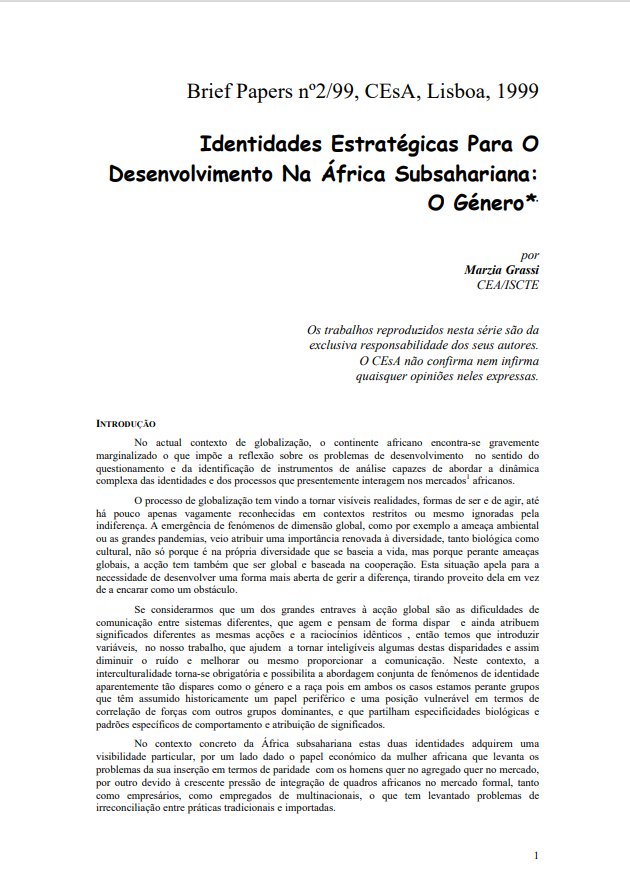
Brief Paper 3/1999: Identidades Estratégicas para o Desenvolvimento na África Subsahariana: O género
Abstract:
In the current context of globalisation, the African continent is seriously marginalised, which makes it necessary to reflect on development problems in order to question and identify analytical instruments capable of dealing with the complex dynamics of identities and processes that are currently interacting in African I-markets. The process of globalisation has made visible realities, ways of being and acting which until recently were only vaguely recognised in restricted contexts or even ignored through indifference. The emergence of phenomena with a global dimension, such as environmental threats or major pandemics, has given renewed importance to diversity, both biological and cultural, not only because diversity itself is the basis of life, but because in the face of global threats, action must also be global and based on cooperation. This situation calls for the need to develop a more open way of managing difference, taking advantage of it rather than seeing it as an obstacle. If we consider that one of the major barriers to global action are the difficulties of communication between different systems, which act and think differently and even assign different meanings to the same actions and identical reasoning, then we have to introduce variables in our work that help to make some of these disparities intelligible and thus reduce the noise and improve or even provide communication. In this context, interculturality becomes compulsory and enables a joint approach to identity phenomena apparently as disparate as gender and race, because in both cases we are dealing with groups that have historically assumed a peripheral role and a vulnerable position in terms of the correlation of forces with other dominant groups, sharing biological specificities and specific patterns of behaviour and meaning attribution. Identidades Estratégicas para o Desenvolvimento na África Subsahariana: O género (Strategic identities for development in Sub-Saharan Africa: gender) was presented at the 1st Portugal – China Congress organised by the University of Trás-os-Montes e Alto Douro in Vila Real, 19-23 April 1999.
Quotation:
Grassi, Marzia. 1999. “Identidades estratégicas para o desenvolvimento na África Subsahariana : o género”. Instituto Superior de Economia e Gestão – CEsA Brief papers nº 3-1999.
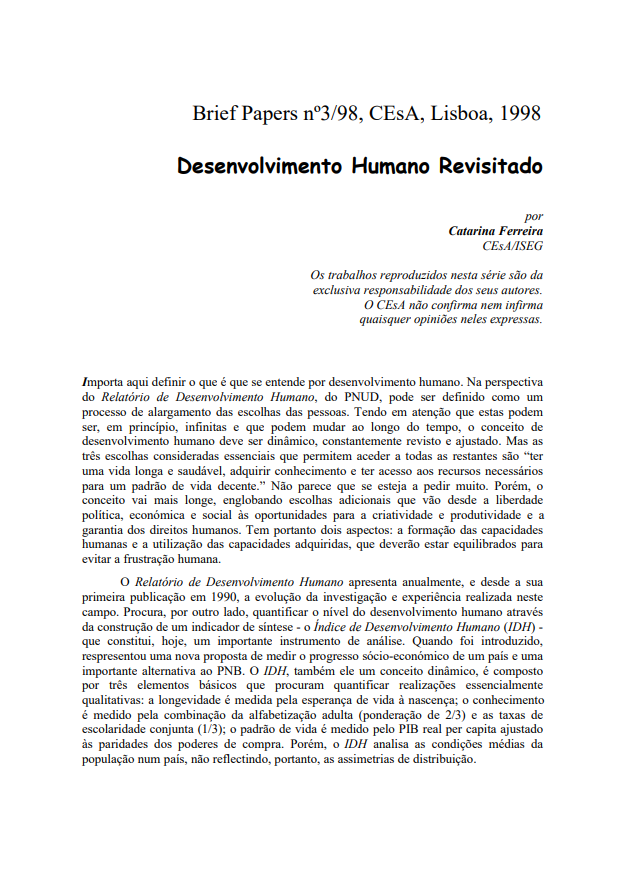
Brief Paper 3/1998: Desenvolvimento Humano Revisitado
Abstract:
Every year since it was first published in 1990, the Human Development Report presents the evolution of research and experience in this field. It also seeks to quantify the level of human development by constructing a synthesis indicator – the Human Development Index (HDI) – which is now an important tool for analysis. When it was introduced, it represented a new proposal to measure the socio-economic progress of a country and an important alternative to the GNP. The HDI, itself a dynamic concept, is made up of three basic elements which seek to quantify essentially qualitative achievements: longevity is measured by life expectancy at birth; knowledge is measured by combining adult literacy (weighting 2/3) and joint schooling rates (1/3); standard of living is measured by real GDP per capita adjusted for purchasing power parities. However, the HDI analyses the average conditions of the population in a country and does not therefore reflect distributional asymmetries. A first version of Desenvolvimento humano revisitado was prepared for Projecfo ED/96/02 Decentralised Cooperation, Fight against Exclusion and Human Development in Portugal, Italy and Belgium, an EC project being prepared by three European NGOs: ACEP – Portugal, Ricerca e Coopcrazione – Italy and ITECO – Belgium.
Quotation:
Ferreira, Catarina. 1998. “Desenvolvimento humano revisitado”. Instituto Superior de Economia e Gestão – CEsA Brief papers nº 3-1998.
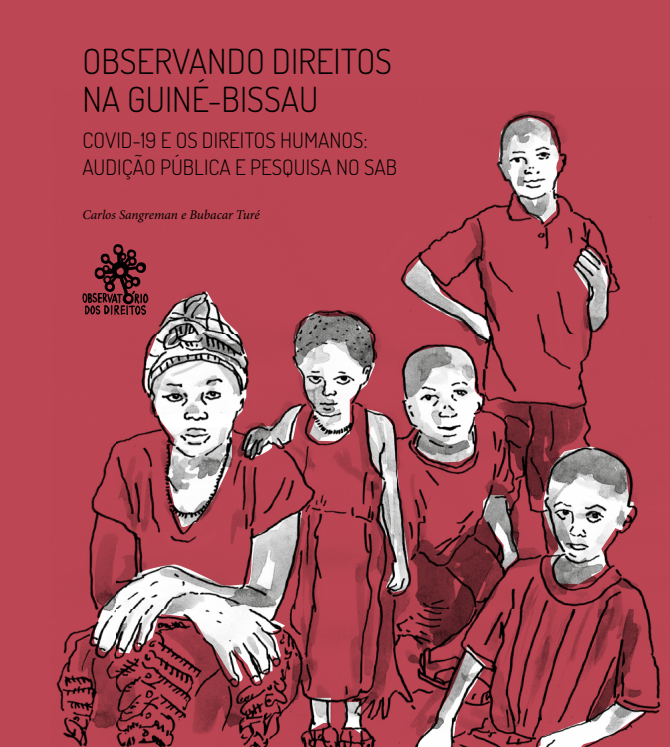
Observando direitos na Guiné-Bissau: Covid-19 e os direitos humanos: audição pública e pesquisa no SAB
Abstract:
Observando Direitos na Guiné-Bissau – Covid-19 e os Direitos Humanos: audição pública e pesquisa no SAB intends to investigate the human rights situation during the Covid-19 pandemic in Guiné-Bissau between January 2020 and January 2022. The framework is based on documentary research on human rights in sub-Saharan Africa from the production of international and specialized organizations, and other non-governmental human rights defenders of the same period. For Guiné-Bissau, in addition to equal research, the communiqués and official bulletins of the “Hight commissariat for Covid-19” were also collected with the information of infected, hospitalized, recovered, deaths and vaccinations, as well as interviews with the newspapers of the Commissioner and the Secretary. With the concentration of cases in the capital, Bissau, the research organize a survey of families, of market sellers and of companies on the effects of the pandemic and the measures enacted by the Government/Presidency to contain. A public hearing was also organized in the House of Rights, with various entities ranging from the High Commissariat to Unions, journalists, and public order police to information about how each institution through its situation and action in this period. As conclusions of the analyses of all these qualitative and quantitative data, it is possible to affirm that Guinea-Bissau’s fragility has such a weight in Guinean society that a disease that has killed fewer people in the country than malaria, diarrhea or tuberculosis has not overlapped with problems arising in poverty and low incomes in general. It affected Human Rights by showing that it was already knew about the enormous shortcomings of the health system, but the effects were more graves on economic and social rights by the abrupt stagnation of economic international activity, the cooperation project, unemployment, and the rise of poverty than directly by the pandemic and measures adopted. The human rights of first generation, more political, freedom of the press and demonstration were affected, with arbitrary arrests and violence practiced by unidentified individuals intensifying the climate of impunity and feeling that the regime is becoming increasingly repressive, but it cannot be said that they were effects directly arising from the pandemic.
Quotation:
Sangreman, C., Turé, B. (2022). Observando Direitos na Guiné-Bissau – Covid-19 e os Direitos Humanos: audição pública e pesquisa no SAB. pag.93. Lisboa: ACEP, com LGDH e CEsA. ISBN 978-9898625-27-4





